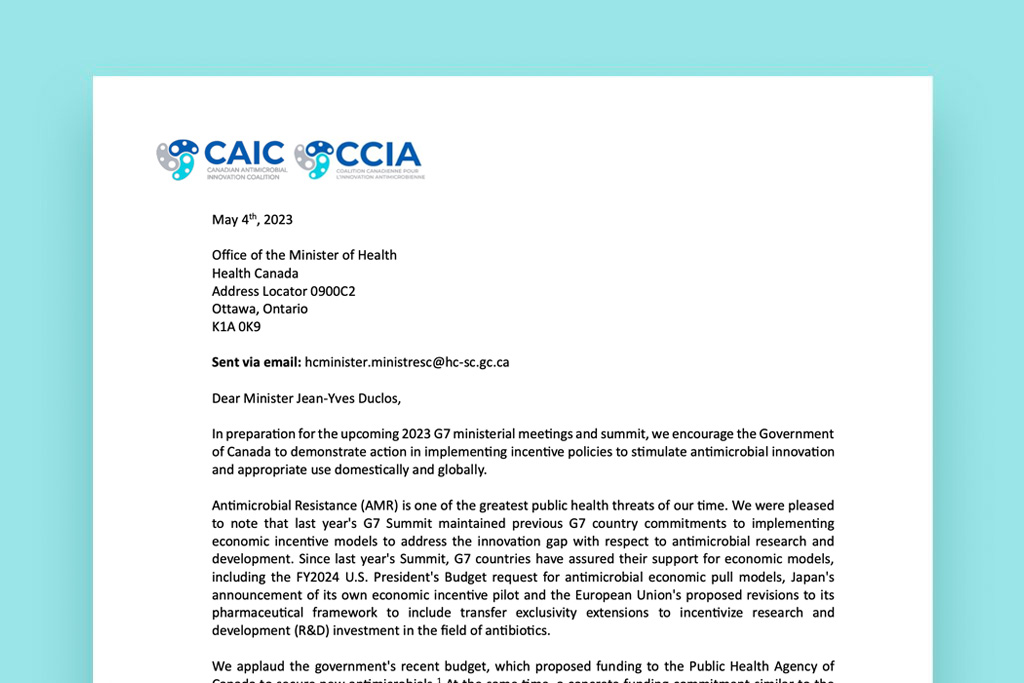CAIC welcomes the release of the Council of Canadian Academies (CCA) report, Overcoming Resistance.
September 11th, 2023 – The Canadian Antimicrobial Innovation Coalition (CAIC) welcomes the release of the Council of Canadian Academies (CCA) report, Overcoming Resistance. CAIC would like to thank the Expert Panel on Antimicrobial Availability and the report’s sponsor, The Public Health Agency of Canada, for their thorough analysis of economic incentive models to encourage market entry and sustained market availability of high-value antimicrobials in Canada.
“CAIC applauds the CCA and its Expert Panel in identifying appropriate market incentives for high-value antimicrobials. The Expert Panel’s inclusion of a made-in-Canada approach that incorporates both push and pull incentives to create a viable and sustainable market while encouraging support for Canadian research and development will impact the lives of Canadians for years to come,” says Dr. Sameeh M. Salama, Chief Scientific Officer, Fedora Pharmaceuticals, Inc. and Chair, Board of Directors, CAIC. “Implementing the appropriate economic incentives will be necessary to make innovative products available to Canadians and contribute to the global fight against antimicrobial resistance (AMR).”
According to the Council of Canadian Academies 2019 report, When Antibiotics Fail, approximately 26% of infections were resistant to the drugs commonly used to treat them in 2018. Prior to COVID-19, this number was expected to increase to 40% by 2050, projecting the loss of 396,000 Canadian lives, an increase of $120 billion in hospital costs, and a $388 billion decrease in GDP. The costs to the healthcare system and Canada’s GDP are already significant – an estimated $1.4 billion and $2.0 billion, respectively, in 2018. Essential medical interventions such as organ transplantations, joint replacements and chemotherapy are becoming riskier as the antimicrobials used to prevent and treat infectious complications from these interventions are losing effectiveness. Meanwhile, the U.S. Centre for Disease Control and Prevention found that hospital-associated AMR infections and deaths rose 15% in 2020 due to the COVID-19 pandemic, undermining the progress made in 20212-2017 to lower U.S. deaths from AMR.[1]
“The Council of Canadian Academies report, coupled with the Pan-Canadian Action Plan on Antimicrobial Resistance, provides an economic and policy framework for federal, provincial and territorial governments to work together to reward innovative antibiotic, diagnostic, and alternative therapies and optimize their access in Canada,” says Dani Peters, Senior Advisor, CAIC. “We encourage the federal government to maintain this positive momentum with a funding commitment to support swift and effective implementation of the Action Plan reflecting the recommendations in the CCA’s report for adequate economic and regulatory to support other important priorities to address AMR in Canada.”
Incentives that reward innovation play a critical role in combatting AMR. Incentives improve access to rapid diagnostics to support antimicrobial stewardship, reinvigorates antimicrobial development, and supports the availability and adoption of alternatives to antibiotics, vaccines and phage therapy, all contribute to bringing higher medical value to patients, improving patient outcomes and reducing adverse events.
Access the Council of Canadian Academies report here: https://cca-reports.ca/reports/pull-incentives-for-high-value-antimicrobials/
[1] CDC. COVID-19: U.S. Impact on Antimicrobial Resistance, Special Report 2022. Atlanta, GA: U.S. Department of Health and Human Services, CDC; 2022. https://www.cdc.gov/drugresistance/covid19.html
About CAIC
The Canadian Antimicrobial Innovation Coalition (CAIC) is a member-based non-profit organization helping to protect Canada’s population from the rise in antimicrobial resistance. We are committed to engaging Canada’s public, health sector and governments on strategies to combat AMR through biomedical innovation. CAIC’s mandate is to protect the Canadian population from the rise in AMR, by positioning Canada to be a leader in AMR research and product development, economic growth, and investment.
CAIC aims to facilitate necessary dialogue and collaboration between relevant partners such as regulators, public policymakers, researchers, and manufacturers. Through its influential membership, CAIC seeks to advocate for certain policy initiatives and advise government officials on appropriate research mechanisms, regulatory incentives aimed at strengthening efforts to combat AMR in Canada, and methods to overcome market barriers.
For more information, visit www.amrinnovation.ca and follow us on Twitter @CanadaAMR and LinkedIn: https://www.linkedin.com/company/canada-amr/.
Adapsyn Bioscience
BD Canada
bioMerieux
Bright Angel Therapeutics
GSK
DiaSorin
DynaLife
Fedora Pharmaceuticals
Innovative Medicines Canada (IMC)
Johnson & Johnson
Nobelex
Nosotech
Paladin Labs
Merck
Microbion
Red Leaf Medical
Roche
SaNOtize
SterileCare
SmartBiotic
Shionogi
Verity Pharmaceuticals
À propos de la CAIC
La Canadian Antimicrobial Innovation Coalition (CAIC) est composée d’acteurs majeurs dans les secteurs de l’innovation biomédicale, de la recherche biopharmaceutique, du diagnostic et de la recherche. Le mandat de la CAIC est de protéger les Canadiens contre la croissance de la résistance aux antimicrobiens (RAM) en faisant du Canada un chef de file en matière de recherche, de développement de produits, de croissance économique et d’investissements relatifs à la RAM. Les membres actuels de notre comité de direction représentent les entreprises suivantes : Adapsyn, BD-Canada, bioMérieux Canada inc. DeNovaMed Inc, Fedora Pharmaceuticals, GSK Inc., Merck Canada Inc. et saNOtize Inc. Pour plus d’information, visitez www.amrinnovation.ca et suivez-nous sur Twitter au CanadaAMR.










